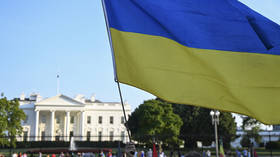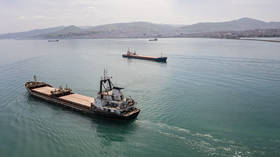US responds to Russia’s Black Sea alert

The US has no plans to assist ships in entering Ukrainian ports, White House Press Secretary Karine Jean-Pierre confirmed on Wednesday, responding to a reporter’s question about the Russian Ministry of Defense’s warning that all ships headed for Ukrainian ports in the Black Sea would be considered military targets.
Washington will “continue to support Ukraine’s effort to get Ukrainian grain to the markets,” Jean-Pierre said, mentioning a $250 million aid package along with seeds, fertilizer, and help with crop storage and processing.
However, when asked how the US planned to “shore up [Ukraine’s] naval capabilities,” she offered only a vague pledge to “make sure they have what they need to defend themselves.”
Port and harbor security equipment was included in the $1.3 billion military aid package announced by the Pentagon on Wednesday. Ukraine will also receive National Advanced Surface to Air Missile Systems, Phoenix Ghost and Switchblade drones, additional artillery rounds and mine clearing equipment, counter-drone and electronic warfare detection equipment, and precision aerial munitions in the latest package, which brings the total amount of military aid supplied by the US since Russia’s military operation began in 2022 to $42.6 billion.
Jean-Pierre’s comments confirmed those of National Security Council spokesman John Kirby, who earlier this week ruled out using US military assets to protect shipments of grain in and out of Ukrainian ports. Instead, the US will “work with other countries” to ensure the grain gets where it needs to go, he said.
Russia withdrew from the Black Sea Grain Initiative on Monday, complaining the US had failed to keep its promises to lift some of the restrictions imposed in the wake of its military operation in Ukraine, including reconnecting its banks to SWIFT, opening an ammonia pipeline to Italy, permitting the import of agricultural machinery and parts, and unblocking transportation insurance and other logistics.
The Kremlin also condemned what it described as a “terror attack” by Ukrainian drones targeting the Crimean bridge, which killed a couple in their vehicle and severely injured their child, but denied it was a factor in the decision to exit the grain deal.
Going forward, all ships traveling to Ukrainian ports “will be considered potential carriers of military cargo,” and the flags of such ships will be seen to be “taking part in the Ukrainian conflict on the side of the Kiev regime,” Russia’s Defense Ministry warned on Wednesday.
Ukrainian President Vladimir Zelensky on Tuesday called on the UN and Türkiye to revive the grain deal without Russia, insisting “everything must be done so we can use this Black Sea corridor.”













